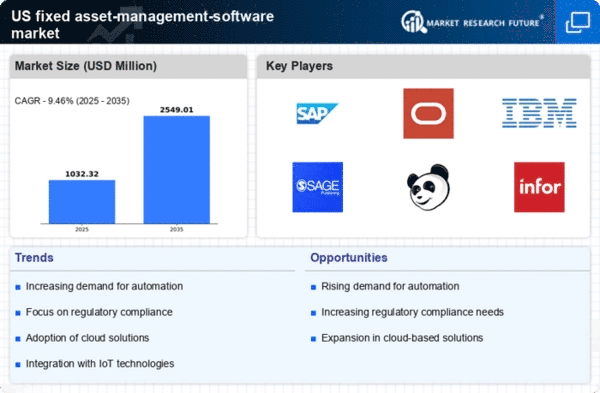Increased Focus on Cost Efficiency
Cost efficiency remains a primary driver in the fixed asset-management-software market. Organizations are under constant pressure to optimize their operations and reduce expenses. Effective asset management software can streamline processes, minimize downtime, and enhance resource allocation. By automating asset tracking and maintenance schedules, companies can achieve substantial cost savings. Research indicates that businesses utilizing fixed asset-management software can improve their asset utilization rates by up to 30%. This focus on cost efficiency is likely to propel the market forward as organizations seek solutions that deliver tangible financial benefits.
Growing Demand for Asset Visibility
The fixed asset-management-software market experiences a notable surge in demand for enhanced asset visibility. Organizations increasingly recognize the importance of tracking and managing their assets in real-time. This trend is driven by the need for accurate financial reporting and compliance with regulatory standards. According to recent data, companies that implement effective asset management solutions can reduce operational costs by up to 20%. As businesses strive for greater transparency and accountability, the fixed asset-management-software market is likely to see continued growth, with firms investing in technologies that provide comprehensive insights into their asset portfolios.
Rise in Regulatory Compliance Requirements
The fixed asset-management-software market is significantly influenced by the rise in regulatory compliance requirements. Organizations are compelled to adhere to stringent financial reporting standards and tax regulations, which necessitate robust asset management solutions. The Financial Accounting Standards Board (FASB) has introduced new guidelines that require companies to maintain accurate records of their fixed assets. This has led to an increased adoption of software solutions that facilitate compliance, thereby driving market growth. It is estimated that compliance-related investments in asset management software could reach $1 billion by 2026, reflecting the critical role of these solutions in meeting regulatory demands.
Technological Advancements in Asset Management
Technological advancements play a pivotal role in shaping the fixed asset-management-software market. Innovations such as the Internet of Things (IoT) and blockchain technology are transforming how organizations manage their assets. IoT devices enable real-time tracking and monitoring of assets, enhancing operational efficiency. Furthermore, blockchain technology offers secure and transparent asset transactions, which can significantly reduce fraud. As these technologies become more integrated into asset management practices, the market is expected to expand. Analysts project that the adoption of advanced technologies could increase the market size by approximately 15% over the next five years.
Expansion of Small and Medium Enterprises (SMEs)
The expansion of small and medium enterprises (SMEs) significantly impacts the fixed asset-management-software market. As SMEs grow, they increasingly require sophisticated asset management solutions to handle their expanding asset portfolios. These businesses often face unique challenges, such as limited resources and the need for scalable solutions. The fixed asset-management-software market is responding by offering tailored solutions that cater to the specific needs of SMEs. It is estimated that the SME segment could account for over 40% of the market share by 2027, highlighting the potential for growth in this area.
















